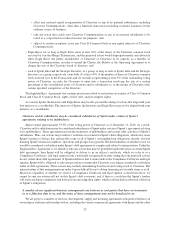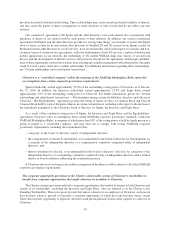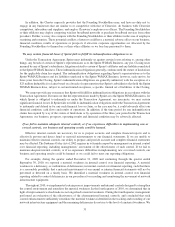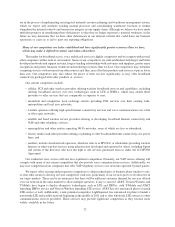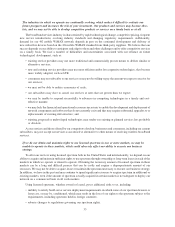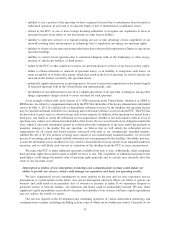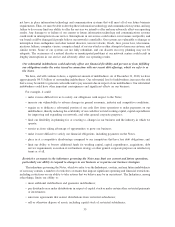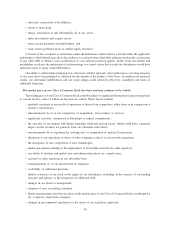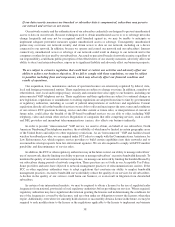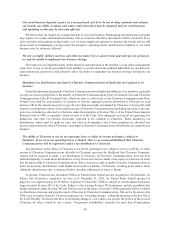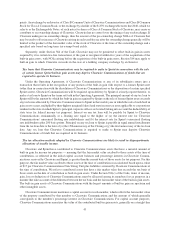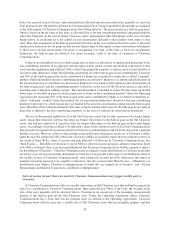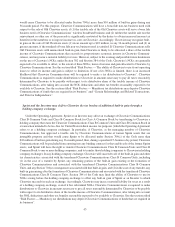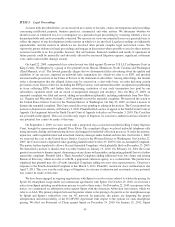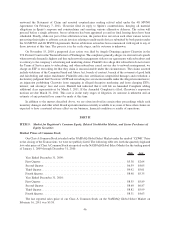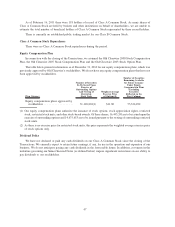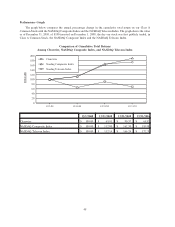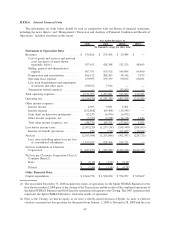Clearwire 2010 Annual Report Download - page 44
Download and view the complete annual report
Please find page 44 of the 2010 Clearwire annual report below. You can navigate through the pages in the report by either clicking on the pages listed below, or by using the keyword search tool below to find specific information within the annual report.strategy. For example, in certain international markets, the licenses we hold, and the applicable rules and
regulations, currently do not specifically permit us to provide mobile services. Thus, before offering mobile
services to our subscribers in those markets, absent action by the regulatory authorities to modify the licenses and
applicable rules, we may need to obtain the approval of the proper regulatory authorities.
The breach of a license or applicable law, even if inadvertent, can result in the revocation, suspension,
cancellation or reduction in the term of a license or the imposition of fines. In addition, regulatory authorities may
grant new licenses to third parties, resulting in greater competition in territories where we already have rights to
licensed spectrum. In order to promote competition, the FCC or other regulatory authorities may also require that
third parties be granted access to our bandwidth, frequency capacity, facilities or services. We may not be able to
obtain or retain any required license, and we may not be able to renew our licenses on favorable terms, or at all.
We may be unable to protect our intellectual property, which could reduce the value of our services and
our brand.
Our ability to compete effectively depends on our ability to protect our proprietary network and system
designs. We may not be able to safeguard and maintain our proprietary rights. We rely on patents, trademarks and
policies and procedures related to confidentiality to protect our intellectual property. Some of our intellectual
property, however, is not covered by any of these protections. Any failure to protect our intellectual property,
including a failure to obtain requested patents or trademark registrations, may reduce the value of our services and
our brand or may result in the loss of rights in which we have invested significant time or costs.
Our pending patent applications may not be granted or, in the case of patents issued or to be issued, the claims
allowed may not be sufficiently broad to protect our intellectual property. Even if all of our patent applications were
issued and were sufficiently broad, our patents may be challenged or invalidated. In addition, the United States
Patent and Trademark Office may not grant federal registrations based on our pending trademark applications. Even
if federal registrations are granted, these trademark rights may be challenged. Moreover, patent and trademark
applications filed in foreign countries may be subject to laws, rules and procedures that are substantially different
from those of the United States, and any foreign patents may be difficult and expensive to obtain and enforce. We
could, therefore, incur substantial costs in prosecuting patent and trademark infringement suits or otherwise
protecting our intellectual property rights.
We could be subject to claims that we have infringed on the intellectual property rights of others, which
claims would likely be costly to defend, could require us to pay damages and could limit our ability to use
necessary technologies in the future.
Competitors or other persons may have independently developed or patented technologies or processes that are
substantially equivalent or superior to ours or that are necessary to permit us to deploy and operate our network,
whether based on legacy or 4G mobile WiMAX technology, or to offer additional services, such as VoIP, or
competitors may develop or patent such technologies or processes in the future. These persons may claim that our
services and products infringe on these patents or other proprietary rights. For instance, certain third parties claim
that they hold patents relating to certain aspects of 4G mobile WiMAX and VoIP technology. These third parties
may seek to enforce these patent rights against the operators of 4G mobile WiMAX networks and VoIP telephony
service providers, such as us. Defending against infringement claims can be time consuming, distracting and costly,
even if the claims prove to be without merit. If we are found to be infringing the proprietary rights of a third party, we
could be enjoined from using such third party’s rights, may be required to pay substantial royalties and damages,
and may no longer be able to use the intellectual property subject to such rights on acceptable terms or at all. Failure
to obtain licenses to intellectual property held by third parties on reasonable terms, or at all, could delay or prevent
the development or deployment of our services and could cause us to expend significant resources to develop or
acquire non-infringing intellectual property.
39


